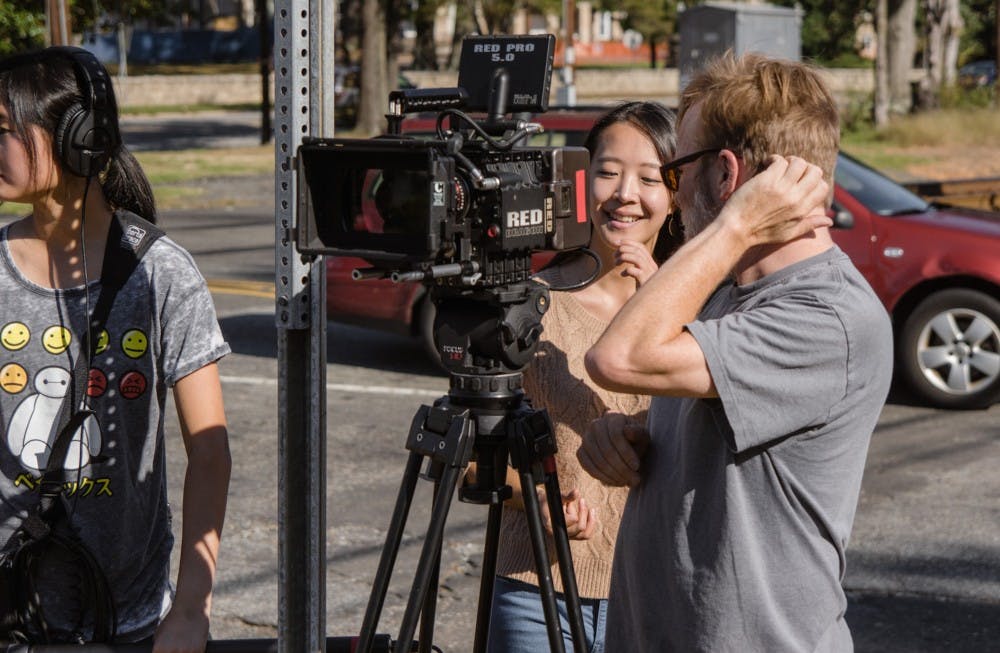For some, it can be difficult to engage in the arts at Duke. Heavy class loads, career-oriented extracurriculars and burgeoning social lives make it difficult to explore the vast array of screenings, exhibits and workshops around campus, all free to students. The Art of the Moving Image department is particularly unsparing in its offerings, often holding screenings of rare 35mm prints and recent limited-release films. Starting Tuesday, AMI will host the Filmcraft series, comprised of workshops designed to provide an understanding of filmmaking equipment and techniques.
The Filmcraft series will run through February and will tackle topics ranging from camera operation and movement to location sound recording and lighting exercises. AMI faculty member and Freewater adviser Steve Milligan spearheads the series, bringing his experience in film production and cinematography to the classes. The workshop series aims to offer an outlet for students to develop core filmmaking skills outside of the classroom.
“Filmmaking has a set of core skills that are universal and foundational, across almost any type of production — lensing, movement, lighting, editing — so the workshop series is an opportunity for students to acquire these skills outside of class, in the order which best suits their interests and ambition.”
Milligan stressed the diversity the Arts of the Moving Image program offers in terms of classes, both in film studies and production, ranging from experimental film to global cinema, celluloid to animation to full-scale modern digital cinema production.
The workshop is open to the Duke community, including students, faculty, staff and alumni, and targeted to those who would like to further advance skills learned in an academic setting. Taking on a new skill can be daunting, especially when faced with unfamiliar technical equipment and with no prior experience. But the workshops require no background in filmmaking, just a genuine interest in learning the ropes.
Even if a student is interested in a single aspect of filmmaking, Milligan suggests that it is still important to be well versed in multiple areas of production and post-production. The classes help inform one another — the lighting workshop, for example, serves as the perfect pairing to camera operation.
“This reflects one of the chief difficulties of filmmaking in general: a successful film requires the application of a wide variety of interdependent skills,” Milligan said. Every person involved in a film should understand film editing, while an editor would benefit from understanding the basics of film directing, cinematography and sound mixing.”
“Until Duke implements this kind of instruction, which I assume they're working on, a concise workshop series seems like a reasonable way to address the problem,” he said.
Through largely hands-on experiential learning, attendees can expect to learn their way around industry-grade equipment, typically found on professional film sets. The workshops will be held in the Rubenstein Arts Center’s AMI studio, which also houses large tungsten and LED lights, that attendees will learn to manipulate to create optimal lighting setups for film. In addition to newly developed production skills, a workshop centered on editing and post-production techniques will close out the series on Feb. 22.
The workshops run for two to three hours, and each session is offered two to three times a semester. Due to time constraints, the emphasis of the workshops is on practical instruction.
“In the workshop, students will use the same equipment and learn the basic skills they will need to make their own films — the operation of cameras, the function of lenses, the use of sound recording equipment and the properties and manipulation of light,” he said.
On campus, there seems to be incessant discussion regarding the intersection of STEM and art. Duke has hosted exhibits that demonstrate art in medicine and the physical sciences, but film production is the ultimate convergence of art and technology. Those pursuing STEM fields with very little interest in film can still find value in the Filmcraft workshops.
“Film is also a fantastically fruitful point of intersection between STEM and the creative arts. The technical tools of filmmaking evolve quickly and under extreme competitive pressure. New technology is pressed into service as soon as it is marginally workable — oftentimes before,” Milligan said. “Cinematography, for example, is alternately described as a science and an art. I had a STEM career myself before I became a cinematographer, that background still serves me every day.”
Successful filmmakers must not only keep up with current technologies and know their way around the equipment, but adapt a personal method of perceiving the world. Analyzing light, movement and sound in an environment can allow for a filmmaker to imagine innovative techniques for presenting a scene and a story. The best filmmakers are often those who break the conventions of filmmaking, but the rules must first be mastered before they can be broken.
“Study light and movement,” Milligan said. “Take note of light in the real world and where it comes from. Also take note of your internal state, how does it make you feel? Imagine how this would advance the story — that's cinematography. Filmcraft then, is the set of skills needed to implement your imagination.”
Get The Chronicle straight to your inbox
Signup for our weekly newsletter. Cancel at any time.

